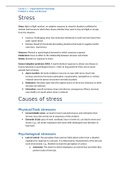Course 1.7 – Organizational Psychology
Problem 6. Stress and Burnout
Stress
Stress: fight or flight reaction, an adaptive response to stressful situations exhibited by
animals and humans in which they choose whether they want to stay and fight or escape
from the situation.
Eustress: Challenging stress that motivates individuals to work hard and meet their
goals. (good stress)
Distress: Result of chronically demanding situations that leads to negative health
outcomes. (bad stress)
Stressors: Physical or psychological demands to which someone responds
Moderators: Have an effect in the relationship between stressors and strains
Strains: Reaction or response to stress
General adaption syndrome (GAS): A nearly identical response to almost any disease or
trauma (physical or psychological stress) - refers to long period of stress not an acute,
episodic form of stress.
1. Alarm reaction: the body mobilizes resources to cope with stress. Heart rate
increase and stress hormones (adrenaline, noradrenaline, epinephrine or cortisol,
released when the person encounters stressful situation)
2. Resistance: the body copes with the original source of stress but resistance to other
stressors are lowered.
3. Exhaustion: overall resistance drops and adverse consequences (illness, burnout,
even death) can result unless stress is reduced.
Causes of stress
Physical/Task stressors
Uncontrollable noise: can lead to lower task performance and motivation (that
stressor may exist and be out of awareness of the workers)
Demands of job: pace of work, workload, hours of work etc. can lead to stress and
strains. E.g., call center employees with more shifts developed more disorders in
their back
Psychological stressors
Lack of control: The perception that a person holds about control over a situation
regulates the response to a stressor. It is influenced by characteristics of the job and
work environment. E.g., flextime increase the perception of control.
o Autonomy: The extent to which employees can control how and when they
perform tasks of their job.
, Course 1.7 – Organizational Psychology
Problem 6. Stress and Burnout
Interpersonal conflict: Negative interactions with co-workers, supervisors, or clients
that range from heated arguments to subtle incidents of unfriendly behavior.
o Scarce resources, incompatible interests, unfair treatment of employees
o Distracting, depression, job dissatisfaction, aggression, sabotage even
violence.
Role stressors: stressors from multiple job task requirements or roles (expectations,
regarding the responsibilities and requirements for a particular job) of employees.
o Role ambiguity: Not clear image of what is expected from them;
experiencing uncertainty about actions, which they should take.
o Role conflict: Demands from different sources are incompatible. (Conflict
of organizational demands and someone’s values, regular in interaction
with environment.)
o Role overload: Stressor that occurs when an individual is expected to fulfill
too many roles at the same time. It can lead to work overload, work and
health problems.
Work family conflict: Situation that occurs when workers experience conflict
between the roles they fulfill at work and in their personal lives.
o Women with children more stress, more coping strategies and easier to
reach social support.
o Mental health problems like depression and anxiety
o Child care offer by companies reduce stress
o Difference with immigrant ratings, less role conflict.
Emotional labor: Regulation of one’s emotions to meet job or organizations
demands. They are achieved by surface or deep acting.
o Surface acting: managing or faking one’s expressions or emotions. (waiters
cover their frustration with rude customers by being polite)
o Deep acting: manage one’s feeling, including trying to change emotions to
match the emotions required for the job. Results to more effective,
authentic
Job dissatisfaction, burnout, turnover
o Challenge-related stressors: Work demands or circumstances that although
potentially stressful they can have gains for individuals. E.g. projects,
amount of work in short time. (positive)
o Hindrance related stressors: Job demands or circumstances that tend to
interfere with an individual’s work achievements. E.g. how politics can
interfere with career potential (negative, more turnover/withdrawal)
Consequences of stress
Behavioral consequences
Information processing: Effects on memory, reaction time, accuracy, task performance,
difficulty, premature reactions.





